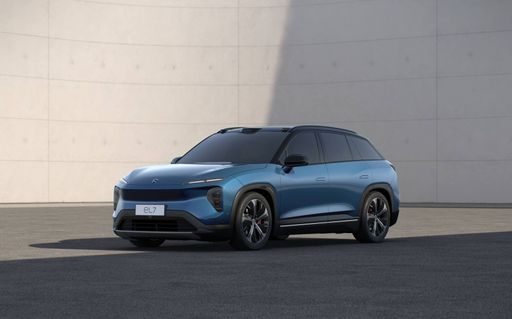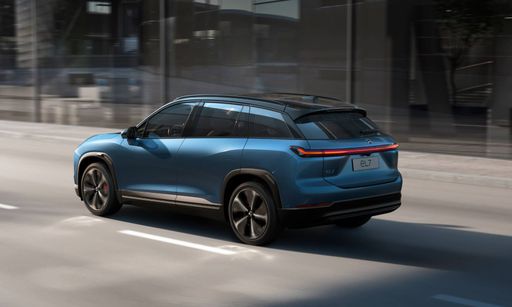Hyundai Tucson VS NIO EL7 – Specs, Efficiency & Price Comparison
Which model is the better choice – the Hyundai Tucson or the NIO EL7? We compare performance (252 HP vs 653 HP), boot capacity (620 L vs 570 L), efficiency (1 L vs 22.10 kWh), and of course, the price (30600 £ vs 63300 £).
Find out now which car fits your needs better!
The Hyundai Tucson (SUV) is powered by a Diesel MHEV, Petrol MHEV, Petrol, Full Hybrid or Plugin Hybrid engine and comes with a Automatic or Manuel transmission. In comparison, the NIO EL7 (SUV) features a Electric engine and a Automatic gearbox.
When it comes to boot capacity, the Hyundai Tucson offers 620 L, while the NIO EL7 provides 570 L – depending on what matters most to you. If you’re looking for more power, you’ll need to decide whether the 252 HP of the Hyundai Tucson or the 653 HP of the NIO EL7 suits your needs better.
There are also differences in efficiency: 1 L vs 22.10 kWh. In terms of price, the Hyundai Tucson starts at 30600 £, while the NIO EL7 is available from 63300 £.
Compare all the key specs now and find out which model fits your lifestyle best!
Hyundai Tucson
The Hyundai Tucson is a standout choice in the compact SUV segment, offering a perfect blend of style, comfort, and practicality. Its modern design is complemented by a spacious interior that provides ample room for passengers and luggage alike. With advanced technology and safety features, the Tucson ensures a smooth and enjoyable driving experience.
details @ hyundai.news
@ hyundai.news
 @ hyundai.news
@ hyundai.news
 @ hyundai.news
@ hyundai.news
 @ hyundai.news
@ hyundai.news
 @ hyundai.news
@ hyundai.news
NIO EL7
The EL7 captivates automotive enthusiasts with its stunning blend of sleek design and advanced technology, making it a standout choice in the electric vehicle market. Its roomy interior is adorned with high-quality materials, ensuring a comfortable and luxurious ride for both driver and passengers. Additionally, the seamless integration of cutting-edge infotainment and safety features enhances the driving experience, appealing to tech-savvy consumers.
details @ NIO
@ NIO
 @ NIO
@ NIO

|

|
|
|
|
Costs and Consumption |
|
|---|---|
|
Price
30600 - 46300 £
|
Price
63300 - 81300 £
|
|
Consumption L/100km
1 - 6.9 L
|
Consumption L/100km
-
|
|
Consumption kWh/100km
-
|
Consumption kWh/100km
22.1 - 22.4 kWh
|
|
Electric Range
64 - 70 km
|
Electric Range
384 - 501 km
|
|
Battery Capacity
-
|
Battery Capacity
73.5 - 90 kWh
|
|
co2
22 - 156 g/km
|
co2
0 g/km
|
|
Fuel tank capacity
42 - 54 L
|
Fuel tank capacity
-
|
Dimensions and Body |
|
|---|---|
|
Body Type
SUV
|
Body Type
SUV
|
|
Seats
5
|
Seats
5
|
|
Doors
5
|
Doors
5
|
|
Curb weight
1520 - 1889 kg
|
Curb weight
2421 - 2441 kg
|
|
Trunk capacity
546 - 620 L
|
Trunk capacity
570 L
|
|
Length
4510 - 4520 mm
|
Length
4912 mm
|
|
Width
1865 mm
|
Width
1987 mm
|
|
Height
1650 mm
|
Height
1720 mm
|
|
Payload
525 - 545 kg
|
Payload
449 - 469 kg
|
Engine and Performance |
|
|---|---|
|
Engine Type
Diesel MHEV, Petrol MHEV, Petrol, Full Hybrid, Plugin Hybrid
|
Engine Type
Electric
|
|
Transmission
Automatic, Manuel
|
Transmission
Automatic
|
|
Transmission Detail
Automat. Schaltgetriebe (Doppelkupplung), Schaltgetriebe, Automatikgetriebe
|
Transmission Detail
-
|
|
Drive Type
Front-Wheel Drive, All-Wheel Drive
|
Drive Type
All-Wheel Drive
|
|
Power HP
136 - 252 HP
|
Power HP
653 HP
|
|
Acceleration 0-100km/h
7.9 - 11.6 s
|
Acceleration 0-100km/h
3.90 s
|
|
Max Speed
180 - 194 km/h
|
Max Speed
200 km/h
|
|
Torque
265 - 367 Nm
|
Torque
850 Nm
|
|
Number of Cylinders
4
|
Number of Cylinders
-
|
|
Power kW
100 - 185 kW
|
Power kW
480 kW
|
|
Engine capacity
1598 cm3
|
Engine capacity
-
|
General |
|
|---|---|
|
Model Year
2024
|
Model Year
2023
|
|
CO2 Efficiency Class
E, F, D, B
|
CO2 Efficiency Class
A
|
|
Brand
Hyundai
|
Brand
NIO
|
Hyundai Tucson
Introducing the Hyundai Tucson: An SUV with Innovation at its Core
The Hyundai Tucson has long been synonymous with reliability, comfort, and exceptional value. With its 2024 model, this popular SUV has taken a bold leap forward by incorporating cutting-edge technology, efficient powertrains, and striking design. Let's delve into the technical details and innovations that make the Hyundai Tucson a standout in the crowded SUV market.
Dynamic Engine Options: Power Meets Efficiency
The Tucson offers a range of powertrains, ensuring there is a model perfect for every driver. Whether you're looking for the fuel efficiency of a mild-hybrid diesel or the power of a plug-in hybrid, the Tucson has you covered. The engine options include:
- Diesel Mild-Hybrid: Combining efficiency with robust performance.
- Benzin Mild-Hybrid: Offering a balance between economy and power.
- Voll-Hybrid: Delivering impressive power while maintaining low fuel consumption.
- Plug-in Hybrid: Offering electric-only driving capabilities with a range of up to 65 km.
These engines are paired with either a manual or automatic transmission, catering to different driving preferences.
Performance and Handling: Experience the Drive
The performance of the Hyundai Tucson is designed to impress, with power outputs ranging from 136 to 252 PS. The Tucson accelerates from 0-100 km/h in as little as 8.1 seconds, managed by precise transmission options such as the dual-clutch and traditional automatic gearboxes. With both front-wheel and all-wheel drive options, the Tucson assures stability and control in varied driving conditions.
Interior and Technology: Comfort Meets Cutting-Edge Innovation
The Tucson's interior is a haven of comfort and technology. With a length ranging up to 4520 mm and a spacious boot capacity of 620 litres, practicality is at the forefront. The intuitive infotainment system includes advanced connectivity features, while driver-assist technologies enhance safety and convenience on every journey.
The choice of luxurious trims and finishes, combined with ergonomic design, ensures that every drive is a pleasure, whether you're on a daily commute or an extended adventure.
Environmental Considerations: Efficiency and Sustainability
Hyundai has made notable strides in ensuring that the Tucson is as environmentally friendly as possible. Models with CO2 emissions as low as 27 g/km place it amongst the leaders in its class for eco-friendly driving. The array of hybrid options further complements Hyundai's commitment to sustainability, providing consumers with green alternatives without compromising performance.
Conclusion: The Hyundai Tucson Is More Than Just an SUV
The 2024 Hyundai Tucson is more than just a means of transport—it's a statement of modernity. It reflects Hyundai's dedication to innovation, efficiency, and comfort, all wrapped up in a stylish and versatile SUV. Whether you're tech-savvy, eco-conscious, or performance-oriented, the Tucson proves to be an ideal choice for forward-thinking drivers.
NIO EL7
The NIO EL7: Revolutionizing the SUV Segment with Innovation and Power
As the landscape of automotive innovation constantly evolves, electric vehicles are firmly staking their claim across segments. Leading this charge is the NIO EL7, marking its presence as a formidable player in the electric SUV market. Beyond its striking aesthetics, the NIO EL7 is a powerhouse of technological innovation and engineering excellence.
Technical Mastery and Performance Prowess
The heart of the NIO EL7 lies in its electric powertrain, which boasts an impressive 653 horsepower. This remarkable power output, combined with a maximum torque of 850 Nm, thrusts the EL7 from 0 to 100 km/h in just 3.9 seconds. Such acceleration is not only a testament to its electric prowess but also a showcase of advanced automotive engineering.
Available in both Long Range and Standard Range versions, the NIO EL7 caters to varied driving needs. The Long Range variant offers an impressive electric range of 501 km on a single charge, facilitated by a consumption rate of 22.1 kWh/100km. Meanwhile, the Standard Range model provides a significant range of 384 km, with a slightly higher consumption of 22.4 kWh/100km.
Engineering Excellence: The Art of Balance
Underpinning the EL7 is its all-wheel-drive system, coupled with an automatic transmission featuring a reduction gearbox. This combination ensures seamless power distribution and superior handling, making the EL7 as comfortable on urban roads as it is on rugged terrains. The vehicle's aerodynamic design, measuring 4912 mm in length, 1987 mm in width, and 1720 mm in height, adds to its performance efficiency, reducing drag and optimizing energy consumption.
Space, Comfort, and Cutting-Edge Technology
The NIO EL7 is in a class of its own when it comes to interior space and comfort. With a generous trunk capacity of 570 L and ample seating for five occupants, the EL7 redefines luxury and convenience in the electric SUV segment. The design ethos revolves around a balance of sophistication and practical functionality, ensuring a top-tier passenger experience.
Technology-wise, the EL7 integrates cutting-edge innovations to enhance driving experience and safety. From advanced connectivity features to state-of-the-art driver assistance systems, the EL7 is as technologically savvy as it is performance-oriented. Its commitment to sustainability is evident, with a CO2 efficiency class rating of A, emphasizing zero emissions and environmental responsibility.
The Future of Electric SUVs is Here
Priced between €73,900 and €94,900, the NIO EL7 embodies the future of electric mobility, merging performance with sustainability without compromising on luxury or safety. With a focus on delivering high power and long-range capabilities, the EL7 stands as a testament to NIO's dedication to reinvigorating the SUV segment. Indeed, for automotive enthusiasts and eco-conscience consumers alike, the NIO EL7 promises an exciting journey ahead—a revolution on wheels that reshapes our understanding of what's possible in an electric SUV.
The prices and data displayed are estimates based on German list prices and may vary by country. This information is not legally binding.
